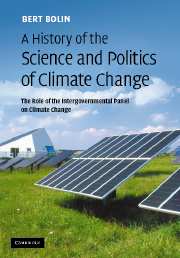 A History of the Science and Politics of Climate Change
A History of the Science and Politics of Climate Change Book contents
- Frontmatter
- Contents
- Foreword by Bo Kjellén
- Abbreviations
- Part I The early history of the climate change issue
- 1 Nineteenth-century discoveries
- 2 The natural carbon cycle and life on earth
- 3 Global research initiatives in meteorology and climatology
- 4 Early international assessments of climate change
- Part II The climate change issue becomes one of global concern
- Part III Are we at a turning point in addressing climate change?
- Some concluding remarks
- Notes
- References
- Name index
- Subject index
3 - Global research initiatives in meteorology and climatology
Published online by Cambridge University Press: 03 May 2010
- Frontmatter
- Contents
- Foreword by Bo Kjellén
- Abbreviations
- Part I The early history of the climate change issue
- 1 Nineteenth-century discoveries
- 2 The natural carbon cycle and life on earth
- 3 Global research initiatives in meteorology and climatology
- 4 Early international assessments of climate change
- Part II The climate change issue becomes one of global concern
- Part III Are we at a turning point in addressing climate change?
- Some concluding remarks
- Notes
- References
- Name index
- Subject index
Summary
Two decades of efforts to develop global research programs in meteorology and climatology led to the formation of the World Climate Research Programme, WCRP, in 1980.
Building scientific networks
The formative years
On 1 April 1960 the USA launched its first meteorological satellite, TIROS 1. It was a remarkable experience for people to be able to view the earth and its atmosphere from the outside. The bluish colour of our planet fascinated observers and a number of well-known features of the circulation of the atmosphere became visible through the cloud formations that they create. Most of what one could see was familiar to the meteorologists. It appeared so consistent with the knowledge that had been taught in basic courses for years. Nevertheless, another dimension had been added. A very effective new tool for observing the weather had become available. The weather services were soon engaged in trying to find out how this new information could best be exploited. Scientists sensed that a new era in meteorology and climatology had begun.
The event was also of profound political importance. A satellite had been launched that might be used internationally for peaceful purposes. Had a new opportunity thereby been opened in the race between the USA and the USSR to be in the lead in space? Would this indeed be the beginning of peaceful global cooperation? President J. F. Kennedy seized the opportunity. In an address to the General Assembly of the United Nations (UN) in 1961 he called on the countries of the world to exploit this new tool jointly.
- Type
- Chapter
- Information
- A History of the Science and Politics of Climate ChangeThe Role of the Intergovernmental Panel on Climate Change, pp. 19 - 32Publisher: Cambridge University PressPrint publication year: 2007
